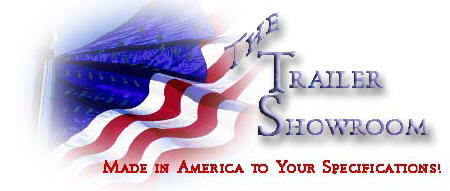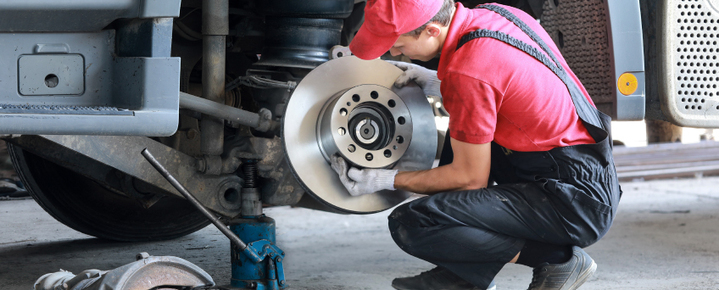Why Understanding Trailer Brake Systems Is Crucial
Your towing vehicle has brakes that help you stop it. With the trailer attached to it, the total load increases, making it challenging for the vehicle's brakes to bring the trailer to a stop. That is where you need the trailer brakes.
While buying a trailer, considering its trailer brake system is also essential. It ensures that your trailer comes to a stop at a controlled pace, without harming the cargo. Moreover, trailer brakes also share the weight of the trailer with the towing vehicle to avoid excess load on it. They also help you comply with state-specific rules on brakes for vehicles exceeding defined weight limits.
To enjoy a safe, smooth, and controlled ride, you must understand how trailer brake systems work. Our blog describes trailer brake systems and their components, mechanisms, and benefits. Knowledge of all these helps you ensure controlled and safe cargo transportation.
What Are Trailer Brake Systems?
A trailer brake system is comprised of brakes, wires, and power supply connections to ensure safe and timely stoppage of your heavy-duty trailer. It is necessary to prevent putting the entire weight of the cargo and trailer on your towing vehicle's brakes.
Trailer brakes work in sync with your tow vehicle's brakes when the brakes are applied. The in-sync operations ensure an even load distribution, which prevents the trailer's push from behind that puts pressure on the hitch. Moreover, their synchronized action slows down both the vehicle and the trailer simultaneously, reducing the stopping distance and preventing skidding. With less pressure on the towing vehicle brakes, the overheating risk declines, improving their effectiveness.
Notwithstanding their mutual connection and functioning, they are different in their function, system, and activation.
| Aspect | Towing vehicle brakes | Trailer brakes |
|---|---|---|
| Location | Vehicle brakes are integrated into the vehicle. | Trailer brakes are on its wheels. |
| Function | Towing vehicle brakes stop the vehicle and have some stopping power over the trailer's weight. | Trailer brakes play a supporting role by stopping the trailer to ensure less wear and tear of the vehicle's brakes and more safety. |
| Activation | A foot pedal at the driver's seat puts pressure on the towing vehicle's brakes. | The trailer braking system is activated by the secondary system, which differs depending on the brake type. Compressed air stops the trailer in the case of air brakes, while an electric signal from the towing vehicle's brake controller activates the electric brakes. In hydraulic surge trailer brakes, the hitch compresses and activates a master cylinder that controls hydraulic braking activity. |
Main Components of Trailer Brake Systems
Brake Controller
Brake controller, as the name suggests, controls the braking force. It is installed in the towing vehicle, but manages the trailer's braking system. It works independently from the vehicle's brakes, so that you can control the trailer and ensure safety, especially when going downhill or towing heavy loads.
You can change the aggressiveness and power of the controller over the trailer brakes, ensuring a quick and smooth response. With the controller in the vehicle, trailer brakes engage properly, helping you prevent vehicle swaying and pushing possibilities.
Braking Mechanism
The trailer braking system also includes the wheels and hubs (including pads, drums or rotors, and shoes). Trailer wheels stay in contact with the road, and they rotate on the structure provided by the hubs. These facilitate the braking action by operating against the wheels when braking force is applied.
Wiring & Power Supply
The wiring system is available in electric trailer brakes. Wires are the communication medium between your vehicle and trailer brakes. When you apply force on the vehicle brakes, the brake controller sends electrical signals to the trailer brakes, lending smoothness to the entire action and response. Keeping the trailer wiring in good condition and properly installed ensures synchronized working of the trailer and vehicle brakes for safe stoppage.
Breakaway systems for safety
What if the trailer detaches from the towing vehicle? The breakaway switch mounted on the trailer saves you here. When the trailer detaches, the switch activates the trailer brakes, so it stays in control. Also called the emergency trailer brakes, the trailer breakaway system is an essential safety feature.
Your trailer braking system can also require an anti-lock braking system (ABS) module. This module ensures that when you apply the brakes, the wheels are not locked, preventing loss of control and skidding. These are necessary on slippery roads, but are generally installed in trailers as part of better safety measures. Very few brake controllers offer such a system, but some very high-end models do.
How Trailer Brake Systems Work
Braking process in varied types of trailer brake systems
Electric brakes
When you press the vehicle's brake pedal, the brake controller transfers a signal to the trailer's wiring system, causing the brake pads to press against the drum. The wheels stop spinning gradually and stop.
Hydraulic brakes
On pressing the vehicle's brakes, pressure is applied to the hydraulic fluid from the hydraulic brake system's master cylinder. The fluid runs through the brake lines and reaches the brake assemblies. Ultimately, the trailer brakes experience the force and come to a halt.
Surge brakes
When you apply pressure to the vehicle's brake pedals, a force works against the vehicle's hitch and rear end, decelerating the vehicle. The slowing vehicle compresses the trailer tongue's actuator, exerting pressure on the trailer's hydraulic lines. This pressure transfers to the brake assembly via the hydraulic fluid, gradually activating the trailer brakes and stopping the trailer.
Air brakes
On pressing the vehicle brakes, the reservoirs release compressed air that is converted by brake chambers into mechanical force. This force engages the trailer brakes and brings the trailer to a halt.
Effects of brake controllers
The working of trailer brake systems also depends on the type of brake controllers used.
Time-delay controllers
These allow you to delay the action of trailer brakes after engaging the vehicle brakes. The braking force on the trailer is preset to ensure stability and prevent wheel lock-up. You can adjust the braking force based on the trailer load. These are best for lighter towing conditions.
Proportional controllers
These work in proportion to the force you apply to your vehicle's brakes. It has an accelerometer sensor that detects the force applied to the vehicle's brakes, converts it into electrical signals, and proportionally applies the same force to trailer brakes. Besides the trailer weight, it also factors in the speed, ensuring smoother and controlled driving and reduced brake wear. If you are considering heavy-duty or long-distance towing, use proportional controllers.
The brake type, its mechanism, and its components make it suitable for specific applications.
- The electric brakes are used in light to heavy-duty trailers, but they need brake controllers.
- For industrial and heavy-duty towing, use air brakes, which are expensive.
- Use surge brakes in recreational trailers because the towing vehicle's braking system type does not matter.
- For large trailers, the hydraulic braking system is appropriate due to its durability.
Helpful Reads:
Top Advantages of a Gooseneck Trailer: The Ultimate Solution for Heavy-Duty Hauling
Why Custom Cargo Trailers Are Smart Investments for Business Owners
Guide to Cargo Trailer Sizes: How to Find the Perfect Fit for Your Needs
Benefits of a High-Quality Brake System
Safety and control
The foremost benefit of a high-quality trailer brake system is safety. When your towing truck or SUV carries the trailer weight, it is fully loaded with heavy weights. When you apply the brakes, the vehicle's brakes and hitch suffer the entire trailer's weight, causing loss of control. With the presence of trailer brakes, they share the burden, ensuring safe stopping.
7 Must-Know Towing Safety Tips for Custom Cargo Trailer Owners
Cargo and tow vehicle protection
The presence of trailer brakes in addition to vehicle brakes evenly distributes the braking force and cargo+trailer load. Such a setup helps you prevent incidents of fishtailing, swaying, and jack-knifing. With this, you can keep your cargo secure and protected, and ensure stable rides.
Conformity with legal requirements
In the US, many states require trailer brakes if the trailer's weight and size exceed a certain weight and height, respectively. Since it is a legal requirement, compliance is mandatory. Installing a high-quality trailer brake system guarantees legal compliance.
Reduced wear on towing vehicle brakes
By sharing the strain of the trailer's load weight with the towing vehicle's brakes, the trailer braking system reduces its workload. It protects your vehicle's brakes from premature ageing due to overheating caused by excessive weight handling. You also save maintenance, repair, and replacement expenses.
Conclusion
It is crucial to understand how the trailer brake system works, so you can understand its benefits. A high-quality trailer brake system is critical for your trailer safety and control. It reduces the load on your towing vehicle's brakes, protecting the cargo and reducing damage to the vehicle's brakes.
Surge, hydraulic, electric, and air brakes are four different types of trailer brakes available in the market. They differ based on working mechanism, pros and cons, and applications. Electric brakes are suitable for all trailer types, and surge brakes are commonly used in recreational trailers and campers. Hydraulic brakes handle heavy weight trailers, while air brakes manage heavy-duty towing.
When selecting the trailer, paying attention to the braking system is essential. For high-quality trailer brakes with the best performance, consider Trailershowroom.com as your vendor. You will find a range of trailer options that fit your towing vehicle and cargo type, with necessary hitch and brake options. Moreover, there's always the best guidance available to help you select the perfect trailer brakes for your towing needs.
Your safety is our priority! Shop for trusted trailer braking solutions at Trailershowroom.com.
FAQs
-
Q1: What are the necessary maintenance tips for trailer braking systems?
You must inspect the trailer brakes regularly for wear and tear, damage, or fluid leakage. Clean the dirt and lubricate the parts to prevent rusting. Examine the suspension components and brake controller settings before going on a transit operation.
-
Q2: Which is the perfect trailer braking system for my vehicle-trailer
combo?
The perfect trailer braking system depends on your exact towing needs. This includes your towing vehicle type and size, trailer weight, towing terrain and conditions, any state-specific laws, budget, and your personal preferences. It is best to consult a trailer expert, like Trailershowroom.com, who will help you select the best trailer and hitch, and install a high-quality trailer brake system for maximum safety and control.
-
Q3: Are emergency brakes essential in a trailer?
They are not compulsory in every state, but many trailers have a breakaway system that activates when the trailer detaches from the vehicle.





